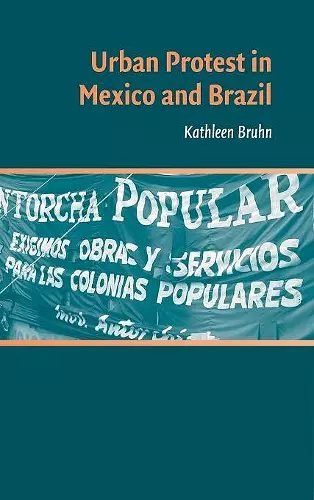Urban Protest in Mexico and Brazil
Format:Hardback
Publisher:Cambridge University Press
Published:3rd Mar '08
Currently unavailable, and unfortunately no date known when it will be back

Analyzes how protest became a key part of organizational maintenance and how organizations use protest as a political tool.
Why do social organizations decide to protest instead of working through institutional channels? This book analyzes why organizations decide to protest. It also outlines the process by which protest became a key part of organizational maintenance, producing constant incentives to protest that do not reflect changing external conditions.Why do social organizations decide to protest instead of working through institutional channels? This book draws hypotheses from three standard models of contentious political action - POS, resource mobilization, and identity - and subjects them to a series of qualitative and quantitative tests. The results have implications for social movement theory, studies of protest, and theories of public policy/agenda setting. The characteristics of movement organizations - type of resources, internal leadership competition, and identity - shape their inherent propensity to protest. Party alliance does not constrain protest, even when the party ally wins power. Instead, protest becomes a key part of organizational maintenance, producing constant incentives to protest that do not reflect changing external conditions. Nevertheless, organizations do respond to changes in the political context, governmental cycles in particular. In the first year of a new government, organizations have strong incentives to protest in order to establish their priority in the policy agenda.
“Kathleen Bruhn, whose earlier work on the Mexican left remains the definitive analysis of the Democratic Revolutionary Party, adds to her initial scholarly reputation with a fascinating, detailed, original exploration of protest movements in Mexico City and São Paulo, based on a unique, author-generated, extensive data-base from newspaper archives. Bruhn masterfully combines a rigorous comparative framework and empirical analysis with qualitative insights and assessments drawn from years of field research, noting the importance of such variables as organizational culture, resources, political context, and party alliances in explaining differences in protest behavior. Urban Protest in Mexico and Brazil establishes a notable benchmark for understanding the nature and impact of social movements in the region.” Roderick Camp, Claremont McKenna College
“Kathleen Bruhn is a first rate scholar and the work presented in this volume is excellent and very innovative. There are some fascinating stories to be told about this material, and Bruhn’s exhaustive fieldwork concentrates on areas which deserve scholarly attention. Her book is based on a fantastic data set which she uses with statistical sophistication without sacrificing the user-friendliness of the text.” Miguel Centeno, Princeton University
“Most movement scholarship is movement ‘centric’ in its ignorance of other parties to contention, and biased toward the study of reform movements in Western democracies. That is what makes Bruhn’s book such a welcome change. Not only does her comparative study of movements in Brazil and Mexico shed light on the dynamics of contention in an important and understudied regime context, but in focusing her analysis on the dynamic relationships between states, parties and movements, the author offers a model for the way movements ought to be studied. This book deserves to find a broad audience in sociology and political science.” Doug McAdam, Stanford University
ISBN: 9780521881296
Dimensions: 234mm x 158mm x 18mm
Weight: 450g
224 pages